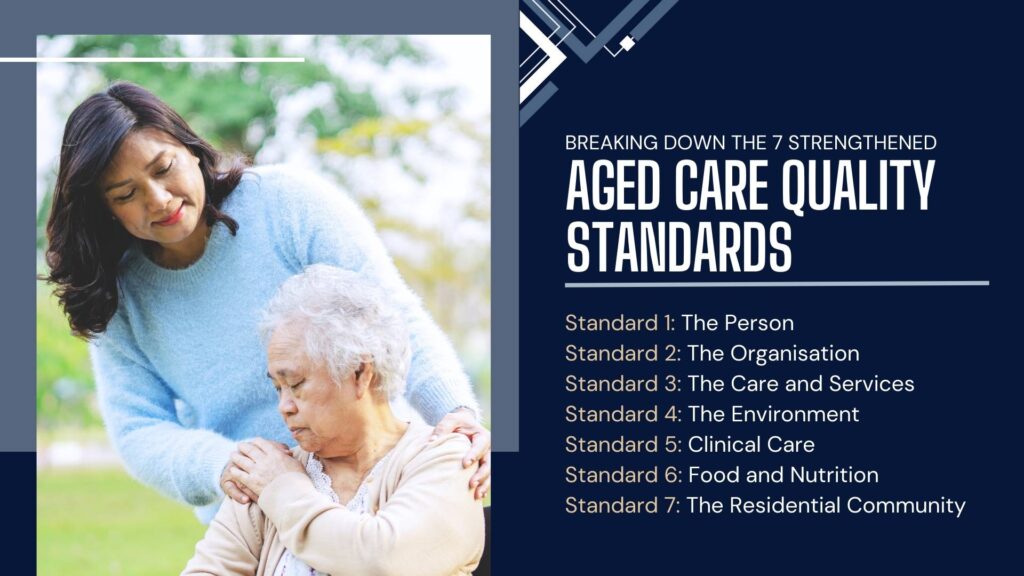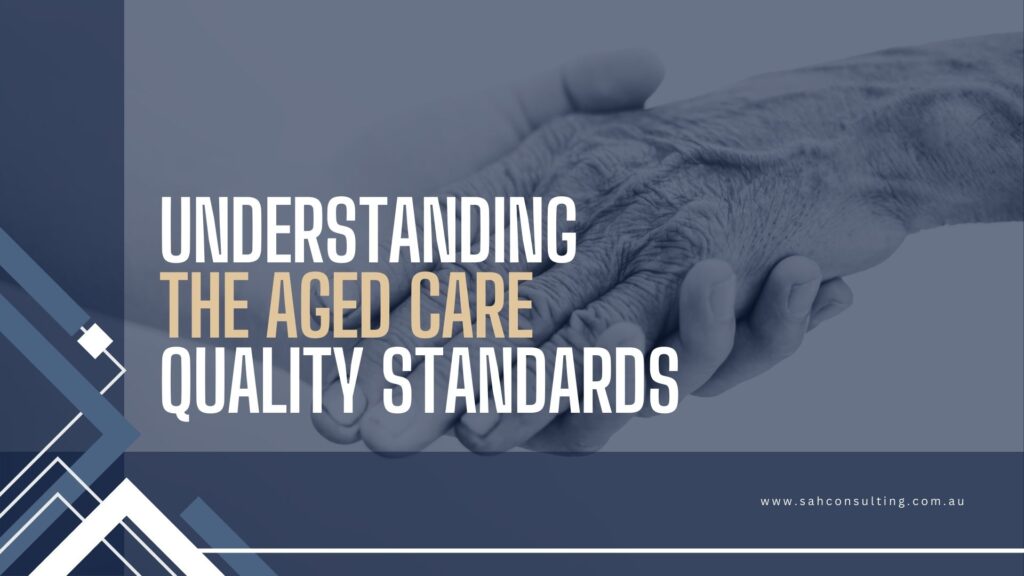The Aged Care Quality Standards are a promise to older Australians, making sure they get safe, top-notch care. They set the bar for what government-funded aged care services should deliver—treating people with dignity and respect, providing solid clinical care, and keeping everything well-managed. It’s all about protecting seniors’ rights and making sure providers step up to meet their needs.
The new Strengthened Aged Care Quality Standards will come into effect from the first of November, 2025. These updates are designed to boost care quality, hold providers to a higher standard, and align with a new Statement of Rights, putting older people first.
The changes will coincide with the launch of the Support at Home program, which replaces the Home Care Packages (HCP) and Short-Term Restorative Care (STRC) programs, and the implementation of the new Aged Care Act. Together, these reforms represent a transformative shift in Australia’s aged care system, prioritising person-centred care and better support for older Australians to live independently and with dignity.
In this article, you will learn what the aged care quality standards are and a few tips and examples on how your aged care business can effectively follow them.
Breaking Down the 7 Strengthened Aged Care Quality Standards
The new aged care quality standards represent a significant shift in aged care legislation. These updated standards will reduce the number of standards from 8 to 7, streamlining expectations while enhancing clarity and measurability. So what are the aged care quality standards that are going to be implemented soon? Here’s a breakdown:

Standard 1: The Person
This standard emphasises dignity, respect, autonomy, and culturally appropriate care. It showcases the updated Statement of Rights, guaranteeing that older individuals are respected and maintain authority over their care.
One of many ways that providers can effectively follow this standard is by implementing regular, individualised care plan reviews with residents and their families to honour personal preferences. For example, allowing a resident to choose their daily activities, even if it involves manageable risks, supports their autonomy and dignity.
Standard 2: The Organisation
This standard establishes definitive expectations for governance and leadership among aged care providers. It underscores the significance of a safety culture, employee training, and strategic planning for providing exceptional care. Providers need to show strong governance structures to guarantee accountability and ongoing enhancement.
Providers can conduct regular staff training on safety protocols and ethical care practises. Implementing quarterly workshops on incident reporting ensures staff are equipped to maintain a culture of safety and transparency.
Standard 3: The Care and Services
This standard outlines how providers are to evaluate, organise, and manage care across various types of services. It guarantees that care is customised to personal requirements and provided through efficient communication and teamwork. This standard emphasises the significance of person-centred care in every facet of service provision.
Aged care providers can develop individualised care plans that incorporate cultural preferences, such as offering culturally appropriate meals or activities. For example, consulting with residents from diverse backgrounds to include traditional foods in meal plans enhances cultural safety and satisfaction.
Standard 4: The Environment
This guideline guarantees that aged care settings are secure, and nurturing, and fulfil the personal requirements of elderly individuals. It encompasses both physical and emotional security, guaranteeing that care environments foster well-being and autonomy.
Regularly assessing and updating care environments to ensure they are safe, accessible, and promote independence is an important part of this standard. Installing grab rails and clear signage to enhance mobility and safety for residents is a good example of conforming to this standard.
Standard 5: Clinical Care
A new dedicated guideline, Standard 5, enhances provider obligations to ensure safe, high-quality clinical care. Created in partnership with the Australian Commission on Safety and Quality in Health Care (ACSQHC), it includes detailed standards for medication management, clinical safety, and palliative care.
This standard guarantees that clinical care adheres to the highest safety and quality standards. For example, using digital health records to track and review medication administration reduces errors and enhances safety.
Standard 6: Food and Nutrition
Another new feature, Standard 6, highlights nutritionally sufficient meals in residential aged care. It acknowledges the dining experience as vital to the quality of life and guarantees that meals satisfy the dietary preferences and requirements of residents. This standard is in accordance with the notion that having access to healthy food is a human right.
To meet Standard 6, work with dietitians to craft tasty, culturally fitting menus that suit residents’ dietary needs and tastes. For instance, serving visually appealing, texture-modified meals helps residents with swallowing issues enjoy safe, satisfying dinners.
Standard 7: The Residential Community
This standard guarantees that elderly care residents can engage in social interactions and participate in meaningful activities. It fosters a feeling of community and inclusion, making certain that residents feel secure, involved, and linked to one another.
To meet Standard 7, providers can organise regular social events that encourage resident participation and foster a sense of belonging. For example, hosting weekly coffee mornings or hobby groups helps residents build connections and feel included in the community.
If you’re already familiar with the old Aged Care Standards, you can see that the Strengthened Aged Care Quality Standards are more detailed, measurable, and comprehensive. They reflect the principles of the new Aged Care Act and setting a higher benchmark for quality and safety in aged care.
Preparing for the Changes in Aged Care
Even if you already know what the aged care quality standards are, adapting to these changes might still be complex and challenging for your business. The tips and examples discussed above are just a few of the many ways that an aged care provider can comply with the Strengthened Aged Care Quality Standards after all. If you want to know more, reach out to SAH Consulting. We specialise in helping aged care providers navigate these transformative changes.
Our team of expert consultants have in-depth knowledge of the current aged care standards and the new requirements under the Strengthened Aged Care Quality Standards and Aged Care Act. We work closely with providers to ensure a smooth transition, offering tailored solutions that align with the updated regulations.
We help providers understand and meet the new standards, including clinical care, governance, and person-centred care requirements. We assist with the phased implementation of the Support at Home program and other reforms. We also support governance bodies in aligning their priorities with the strengthened standards and fostering a culture of safety and quality.
With SAH Consulting, you can confidently navigate the new aged care legislation, ensuring your organisation not only meets but exceeds the new expectations.
Final Thoughts on The Strengthened Aged Care Quality Standards
The new Strengthened Aged Care Quality Standards and the Support at Home program are a big deal for aged care in Australia. They show a real push to put older people first, focusing on their safety, quality of care, and individual needs. These changes are all about making life better for seniors, holding providers to higher standards, and ensuring services truly work for everyone.
As the aged care sector prepares for these changes, it’s essential for providers to stay informed and proactive. For expert guidance on navigating these reforms, SAH Consulting is here to help. Let’s work together to shape a future where aged care is safe, respectful, and empowering for all. Connect with us today.
